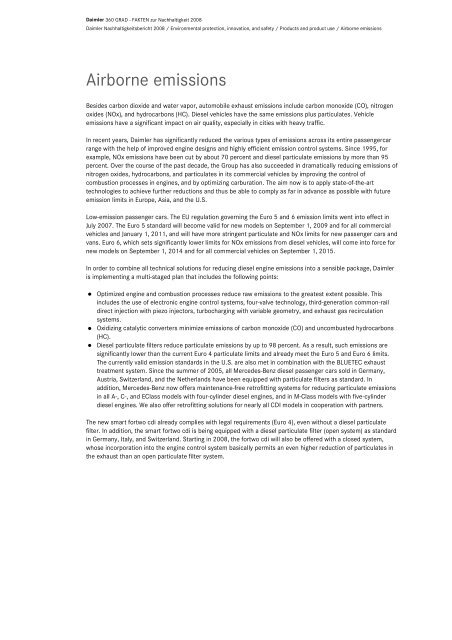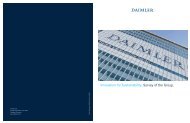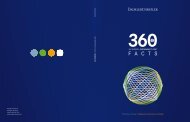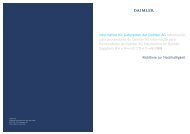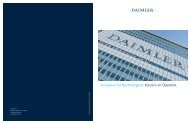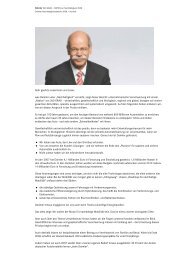Dear readers, This report describes what Daimler means by ...
Dear readers, This report describes what Daimler means by ...
Dear readers, This report describes what Daimler means by ...
Create successful ePaper yourself
Turn your PDF publications into a flip-book with our unique Google optimized e-Paper software.
<strong>Daimler</strong> 360 GRAD - FAKTEN zur Nachhaltigkeit 2008<br />
<strong>Daimler</strong> Nachhaltigkeitsbericht 2008 / Environmental protection, innovation, and safety / Products and product use / Airborne emissions<br />
Airborne emissions<br />
Besides carbon dioxide and water vapor, automobile exhaust emissions include carbon monoxide (CO), nitrogen<br />
oxides (NOx), and hydrocarbons (HC). Diesel vehicles have the same emissions plus particulates. Vehicle<br />
emissions have a significant impact on air quality, especially in cities with heavy traffic.<br />
In recent years, <strong>Daimler</strong> has significantly reduced the various types of emissions across its entire passengercar<br />
range with the help of improved engine designs and highly efficient emission control systems. Since 1995, for<br />
example, NOx emissions have been cut <strong>by</strong> about 70 percent and diesel particulate emissions <strong>by</strong> more than 95<br />
percent. Over the course of the past decade, the Group has also succeeded in dramatically reducing emissions of<br />
nitrogen oxides, hydrocarbons, and particulates in its commercial vehicles <strong>by</strong> improving the control of<br />
combustion processes in engines, and <strong>by</strong> optimizing carburation. The aim now is to apply state-of-the-art<br />
technologies to achieve further reductions and thus be able to comply as far in advance as possible with future<br />
emission limits in Europe, Asia, and the U.S.<br />
Low-emission passenger cars. The EU regulation governing the Euro 5 and 6 emission limits went into effect in<br />
July 2007. The Euro 5 standard will become valid for new models on September 1, 2009 and for all commercial<br />
vehicles and January 1, 2011, and will have more stringent particulate and NOx limits for new passenger cars and<br />
vans. Euro 6, which sets significantly lower limits for NOx emissions from diesel vehicles, will come into force for<br />
new models on September 1, 2014 and for all commercial vehicles on September 1, 2015.<br />
In order to combine all technical solutions for reducing diesel engine emissions into a sensible package, <strong>Daimler</strong><br />
is implementing a multi-staged plan that includes the following points:<br />
� Optimized engine and combustion processes reduce raw emissions to the greatest extent possible. <strong>This</strong><br />
includes the use of electronic engine control systems, four-valve technology, third-generation common-rail<br />
direct injection with piezo injectors, turbocharging with variable geometry, and exhaust gas recirculation<br />
systems.<br />
� Oxidizing catalytic converters minimize emissions of carbon monoxide (CO) and uncombusted hydrocarbons<br />
(HC).<br />
� Diesel particulate filters reduce particulate emissions <strong>by</strong> up to 98 percent. As a result, such emissions are<br />
significantly lower than the current Euro 4 particulate limits and already meet the Euro 5 and Euro 6 limits.<br />
The currently valid emission standards in the U.S. are also met in combination with the BLUETEC exhaust<br />
treatment system. Since the summer of 2005, all Mercedes-Benz diesel passenger cars sold in Germany,<br />
Austria, Switzerland, and the Netherlands have been equipped with particulate filters as standard. In<br />
addition, Mercedes-Benz now offers maintenance-free retrofitting systems for reducing particulate emissions<br />
in all A-, C-, and EClass models with four-cylinder diesel engines, and in M-Class models with five-cylinder<br />
diesel engines. We also offer retrofitting solutions for nearly all CDI models in cooperation with partners.<br />
The new smart fortwo cdi already complies with legal requirements (Euro 4), even without a diesel particulate<br />
filter. In addition, the smart fortwo cdi is being equipped with a diesel particulate filter (open system) as standard<br />
in Germany, Italy, and Switzerland. Starting in 2008, the fortwo cdi will also be offered with a closed system,<br />
whose incorporation into the engine control system basically permits an even higher reduction of particulates in<br />
the exhaust than an open particulate filter system.


